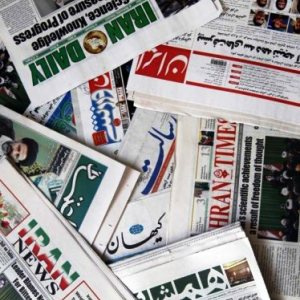Tehran's Daily Newspaper Review

Among the major Iranian newspapers, it was only the Reformist Shargh that prominently covered the news of Asghar Farhadi’s “A Separation” Academy Award, the first ever for an Iranian film.
Jomhouri-ye Eslami’s top headline was the news of anti-US protests spreading from Afghanistan to other Muslim countries in protest against the Quran burning incident at a NATO military base in Bagram, Afghanistan. The front page was decorated by a familiar picture of Pakistani protestors burning the US flag in anger. The parliament’s Research Center, chaired by Ahmad Tavakkoli, collided with Ahmadinejad's cabinet once again, claiming that the figures provided by the government for the next Persian year’s budget are unrealistic. The newspaper pointed to the consensus between Moscow and Washington in supporting Yemen’s new president, Abdurabu Mansur Hadi. The newspaper’s editorial focused on the recent chain blasts in Iraq, introducing Turkey and Tariq al-Hashemi’s supporters--among usual suspects the US and Saudi Arabia--as the key beneficiaries of such terrorist attacks. Calling alQaeda the US’ and Saudi Arabia’s “operative branch”, the editorial warned about a “Salafai Crescent” –in contrast to the oft-warned of Shi’a Crescent- aspired to by Riyadh.
Kayhan quoted CNN in its top headline, saying that “Iran will determine Obama's fate” amid the “unprecedented crisis in the EU and the US”. The newspaper also reported of how the Syrians “thwarted foreign conspiracy” voting in favor of the country’s amended constitution in a referendum held on Monday. After three decades, Abdullah Jasbi was finally manhandled from his much-vied position as head of the multi-billion dollar academic enterprise, Islamic Azad University, and to be replaced by Farhad Daneshjou, whose brother Kamran serves as Ahmadinejad's minister of higher education. Kayhan introduced another of its specialty feature reports, this time on the upcoming parliamentary elections, claiming that “combating the enemy’s ceaseless plots, discouraging the enemy from continuation of hostility and displaying popular response to the recent pressures” exerted by the West are the main criteria of voters in electing their favorite candidates for the Majles’ seats.
The top headline of Resalat was a quote from Conservatives’ spiritual leader Ayatollah Mahdavi Kani, who reiterated his support for the United Principlist Front –which entails the mainstream Principlist groups in Iranian politics- for the ninth parliamentary elections. Resalat also published news from Iran's IAEA Envoy Ali-Asghar Soltanieh, who stated that any access to Iran's nuclear sites (including Parchin) hinges upon drawing up a cooperation modality with the IAEA.
Shargh covered its front page with a picture of Asghar Farhadi posing with the Oscar statuette, besides the title “For my Iran,” after Farhadi delivered a patriotic speech in the ceremony. “The president can control the Guardian Council’s conduct,” the newspaper quoted Iran's Editor-in-Chief Ali Akbar Javanfekr, a novel legal interpretation that will infuriate the Conservatives. The newspaper’s editorial was penned by Ahmad Masjed-Jame’i, Minister of Culture in Mohammad Khatami's era, in praise of Asghar Farhadi’s award and the diplomatic influence of Iranian cinema.
Tehran-e Emrooz’ top news was the installation of Farhad Daneshjou as the new head of Islamic Azad University, and the objections made by the Board of Trustees over the procedure of the appointment. “Will the government’s foreign exchange bomb tame the market?” the newspaper asked, quoting the Vice President who said that the anticipated bomb will have such unexpected outcomes that it will dazzle economic activists. The newspaper’s editorial was written by the United Principlists’ Front candidate for Tehran Mahmoud Farshidi. The former Education Minister criticized the Western democracies for their unethical electoral mechanisms, and praised the front for ‘injecting enthusiasm to the society.’
“The Azad University president has changed, but Mehdi Hashemi’s mission is not over,” Vatan-e Emrooz quoted United Principlists’ Front candidate Mehrdad Bazrpash, who referred to allegations that Mahdi Hashemi, son of Ayatollah Rafsanjani and a key operative in Islamic Azad University who is now residing in the UK, is still leading his assumedly subversive projects to undermine the establishment. “The United Principlists’ Front enjoys eye-catching basirat,” or the power to discern right from wrong, the newspaper quoted Ali-Reza Panahian, a hardliner critic and a United Principlists’ Front candidate from the Tehran constituency. Interestingly, Vatan-e Emrooz dedicated half of its Culture Page to the news of the Oscar for “A Separation”.
* Notes:
The editorial section of Iranian newspapers is not the work of the editor-in-chief or the senior editorial staff of the newspaper by default, but can be a contribution by experts and politicians (typically agreeing with the newspaper’s political stance.) The newspapers may also occasionally publish without an editorial.
Vatan-e Emrooz daily does not publish on Thursdays.
Trouble with understanding some terms? Check our Glossary of Iranian Political Terms.
Briefing
Iran is the official organ of the administration. Its current editor-in-chief is Ali-Akbar Javanfekr, former media advisor to President Mahmoud Ahmadinejad.
Jomhouri-ye Eslami (The Islamic Republic) was known as the official organ of the Party of the Islamic Republic, founded in 1979 and disbanded in 1987. Currently, it is an open critic of Mahmoud Ahmadinejad's policies and is known to be a mouthpiece of Akbar Hashemi Rafsanjani.
Kayhan (Universe) is a hard-line conservative newspaper. Its editor-in-chief –currently Hossein Shari’atmadari- is directly appointed by Iran's Supreme Leader. Shari’atmadari’s editorials often spark off controversy and debate inside Iranian political circles.
Resalat (Mission) belongs to the moderate wing of the Principlist camp. Resalat’s best known analyst is Amir Mohebbian, its political editor.
Shargh (East) is a moderate Reformist newspaper. It was the most popular and influential Reformist newspaper in its first period of publication which lasted from August 2003 until September 2006.
Tehran-e Emrooz (Tehran Today) is a “Principlist/Reformist” newspaper, connected to Mohammad Baqer Qalibaf, Tehran Mayor and a likely candidate of the 2013 presidential election.
Vatan-e Emrooz (Motherland Today) is a supporter of the president’s policies.

